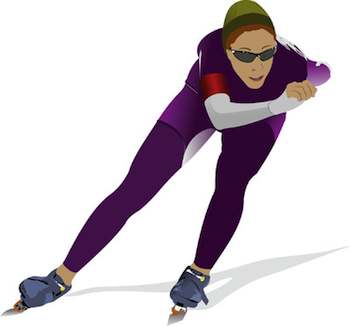- MENU
- HOME
- SEARCH
- WORLD
- MAIN
- AFRICA
- ASIA
- BALKANS
- EUROPE
- LATIN AMERICA
- MIDDLE EAST
- United Kingdom
- United States
- Argentina
- Australia
- Austria
- Benelux
- Brazil
- Canada
- China
- France
- Germany
- Greece
- Hungary
- India
- Indonesia
- Ireland
- Israel
- Italy
- Japan
- Korea
- Mexico
- New Zealand
- Pakistan
- Philippines
- Poland
- Russia
- South Africa
- Spain
- Taiwan
- Turkey
- USA
- BUSINESS
- WEALTH
- STOCKS
- TECH
- HEALTH
- LIFESTYLE
- ENTERTAINMENT
- SPORTS
- RSS
- iHaveNet.com
2010 Vancouver Winter Olympics - Katherine Hobson

You probably think the typical Olympic athlete's big nutritional concern is eating enough to make it through the day's workout(s). That's certainly true for some. Cross-country skiers, particularly women, have a difficult time consuming the 4,000 or 5,000 calories they may need to replace what they're burning off, says
But then there's the poor Olympic ski jumper.
The physics of that sport dictate that he (a bid to add a women's event in
Between these two extremes -- the ski jumper Jack Sprat and his wife the cross-country skier -- lies an incredible diversity of nutritional needs that depend on the athlete's sport, gender, competition conditions, and other factors. The starting point for addressing them is no different from the one for civilians.
"Athletes do not need a diet substantially different from that recommended in the 2005 Dietary Guidelines" or the Canadian equivalent, says a 2009 position statement on nutrition and athletic performance issued by the
From that baseline healthful diet, the tinkering starts. Here are some of the eating considerations faced by the athletes in
SPORT OF CHOICE.
Generally, dietitians will prescribe a certain number of grams of carbs, protein, and fat per kilogram of an athlete's body weight to match the particular demands of her workout -- i.e., its length, frequency, and intensity.
For average folks, macronutrient recommendations are usually expressed in percentage of daily calories. The acceptable range is 10 to 35 percent protein, 45 to 65 percent carbohydrates, and 20 to 35 percent fat. For a 2,000-calorie diet, that would mean between 50 and 175 grams protein, 225 to 325 grams carbohydrate, and 44 to 78 grams fat per day. To keep calories constant, obviously, the more you have of one nutrient, the less you'll have of another.
While athletes do follow a balanced diet, Meyer tends to recommend a little more protein for sprinters, especially after an exercise session, to help build the muscle that characterizes their physique. Longer-distance competitors often need more carbohydrates for recovery, she says.
WEIGHT AND BODY COMPOSITION GOALS.
Athletes whose sports require a relatively small energy expenditure -- like ski jumpers -- or who are above their ideal competition weight need to lose pounds without chipping away at the muscle that makes them successful. For a skater attempting to drop a few pounds, Meyer says she will continue to match the carbs to training needs, since that's the main fuel for performance, but will increase the protein to 2g/kg and reduce fat consumption. She says that combination will protect against losing lean muscle mass as weight declines.
And then there are those who can't take in enough. Women are susceptible because they typically have a smaller appetite than men, says Parker-Simmons, who helps the U.S. ski and snowboarding team with nutrition. And it doesn't take long for a caloric deficit to result in amenorrhea -- a cessation of the menstrual cycle. (Losing your period is not necessarily a function of body fat, says Meyer, but can happen simply from eating 500 or so fewer calories than you need for five days in a row.) For athletes struggling to keep weight on, Meyer says she'll stick with healthful, good-quality foods but just prescribe more of them to boost calories.
ALTITUDE.
Traveling to high altitudes to compete or train can wreak its own havoc. The body dehydrates and also needs more energy, since the heart is working harder to pump blood, says Parker-Simmons. Her solution: sports drink, which addresses both issues. (Liquid calories should not be in the form of alcohol, which will only increase dehydration.) Some athletes, particularly women, also need to take in more iron while they're at high altitudes, but this varies a lot from person to person. (Self-medication is therefore a bad idea; see a nutritionist or physician and get your iron status tested before you use supplements.)
COLD.
The outside temperature isn't so important if you're warm on the inside -- dressed appropriately, and working out at a level that keeps your core temperature steady. But it can be a factor in some events, like downhill skiing, ski jumping, and snowboarding, where there are blocks of time with no activity -- weather delays, chairlift trips, long waits before the start at the top of the mountain.
"When you really start shivering, you burn carbs more and your glycogen is depleted," says Meyer. Since that's the last thing you want to do before a big event, it's time to reach for a warm sports drink or hot chocolate.
2010 Vancouver Winter Olympic Games
Winter Olympics Nutrition Plan: What the Athletes Eat